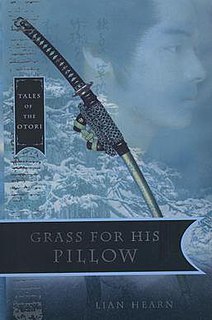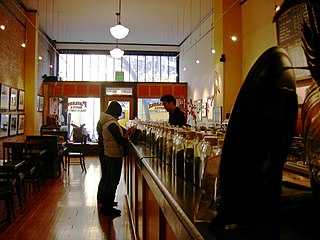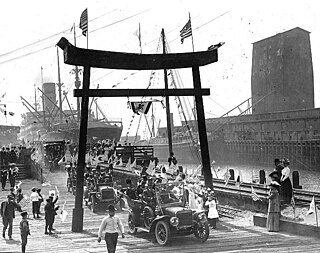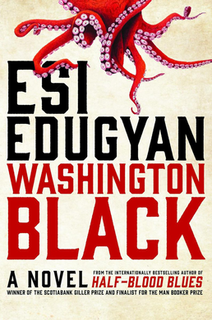
During World War II, the United States forcibly relocated and incarcerated about 120,000 people of Japanese ancestry, most of whom lived on the Pacific Coast, in concentration camps in the western interior of the country. Approximately two-thirds of the internees were United States citizens. These actions were initiated by president Franklin D. Roosevelt via executive order shortly after Imperial Japan's attack on Pearl Harbor.

The Chinatown–International District of Seattle, Washington is the center of Seattle's Asian American community. Within the Chinatown International District are the three neighborhoods known as Seattle's Chinatown, Japantown and Little Saigon, named for the concentration of businesses owned by people of Chinese, Japanese and Vietnamese descent, respectively. The geographic area also once included Seattle's Manilatown. The name Chinatown/International District was established by City Ordinance 119297 in 1999 as a result of the three neighborhoods' work and consensus on the Seattle Chinatown International District Urban Village Strategic Plan submitted to the City Council in December 1998. Like many other areas of Seattle, the neighborhood is multiethnic, but the majority of its residents are of Chinese ethnicity. It is one of eight historic neighborhoods recognized by the City of Seattle. CID has a mix of residences and businesses and is a tourist attraction for its ethnic Asian businesses and landmarks.

Grass for His Pillow is the second novel in Lian Hearn's Tales of the Otori trilogy, published in 2003. The events in the novel cover a period of approximately 6 months, following directly after those in Across the Nightingale Floor.
Yoshiko Uchida was a Japanese American writer.

No-No Boy is a 1957 novel, and the only novel published by the Japanese American writer John Okada. It tells the story of a Japanese-American in the aftermath of the internment of Japanese Americans during World War II. Set in Seattle, Washington, in 1946, the novel is written in the voice of an omniscient narrator who frequently blends into the voice of the protagonist.

William Kunpei Hosokawa was a Japanese American writer and journalist. While interned at the Heart Mountain Relocation Center, he was the editor of the internment camp's newspaper, The Heart Mountain Sentinel. After being freed from the camp in 1943, Hosokawa worked as a columnist and editor at The Denver Post for 38 years. He retired from the newspaper industry in 1992, at the age of 77.
The Boy at War trilogy is a series of young adult historical novels by Harry Mazer. The first book, A Boy at War was released on April 3, 2001 and is based on the events of the attack on Pearl Harbor that initiated the United States' involvement in World War II. The books follow Adam Pelko, the son of a navy commander stationed at Pearl Harbor, during the Japanese attack of December 7, 1941.

The Panama Hotel in Seattle, Washington's International District was built in 1910. The hotel was built by the first Japanese-American architect in Seattle, Sabro Ozasa, and contains the last remaining Japanese bathhouse (sento) in the United States.
Under the Blood Red Sun is a historical novel by Graham Salisbury, published in 1995. An award-winning feature film by Japanese-American director Tim Savage and produced by Dana Satler Hankins, from a screenplay by Salisbury, was released in 2014.

"R" Is for Ricochet is the 18th novel in Sue Grafton's "Alphabet" series of mystery novels and features Kinsey Millhone, a private eye based in Santa Teresa, California.
Monica Sone, born Kazuko Itoi, was a Japanese American writer, best known for her 1953 autobiographical memoir Nisei Daughter, which tells of the Japanese American experience in Seattle during the 1920s and 1930s, and in the World War II internment camps and which is an important text in Asian American and Women's Studies courses.

The Samurai's Garden is a 1994 novel by American author Gail Tsukiyama. Many consider it to be Tsukiyama's finest work, and an influential piece in Asian American literature. The Samurai's Garden is often included in required reading lists for high school students, and is considered to be a prime example of using effective figurative language.
99 Years of Love 〜Japanese Americans〜 is a five-episode Japanese-language TV miniseries produced by TBS for its 60th anniversary announced in 3–7 November 2010, starring Tsuyoshi Kusanagi and Yukie Nakama, and sponsored by Toyota and Panasonic.

When the Emperor was Divine is a historical fiction novel written by American author Julie Otsuka about a Japanese American family sent to an internment camp in the Utah desert during World War II. The novel, loosely based on the wartime experiences of Otsuka's mother's family, is written through the perspective of four family members, detailing their eviction from California and their time in camp. It is Otsuka's debut novel, and was published in the United States in 2002 by Alfred A. Knopf.

Allegiance is a musical with music and lyrics by Jay Kuo and a book by Marc Acito, Kuo and Lorenzo Thione. The story, set during the Japanese American internment of World War II, was inspired by the personal experiences of George Takei, who stars in the musical. It follows the Kimura family in the years following the attack on Pearl Harbor, as they are forced to leave their farm in Salinas, California and are sent to the Heart Mountain Relocation Center in the rural plains of Wyoming.

Jamie Ford is an American author. He is best known for his debut novel, Hotel on the Corner of Bitter and Sweet. The book spent 130 weeks on the New York Times Bestseller List, and was also awarded best "Adult Fiction" book at the 2010 Asian/Pacific American Awards for Literature. The book was also named the No. 1 Book Club Pick for Fall 2009/Winter 2010 by the American Booksellers Association.

There is a population of Japanese Americans and Japanese expatriates in Greater Seattle, whose origins date back to the second half of the 19th century. Prior to World War II, Seattle's Japanese community had grown to become the second largest Nihonmachi on the West Coast of North America.

Weedflower is a 2006 American children's historical novel by Cynthia Kadohata, the author of the award-winning Kira-Kira. The cover photography of the first edition is by Kamil Vojnar. The story is set in the United States during World War II and told from the perspective of twelve-year-old Japanese-American Sumiko. A 6.5 hours long audiobook version of Weedflower, read by Kimberly Farr, has been published.

With Beauty and Sorrow is a 1965 Japanese drama film directed by Masahiro Shinoda. It is based on the novel Beauty and Sadness(1961–63) by Nobel Prize winning writer Yasunari Kawabata.

Washington Black is the third novel by Canadian author Esi Edugyan. The novel was published in 2018 by HarperCollins in Canada and by Knopf Publishers internationally. A bildungsroman, the story follows the early life of George Washington "Wash" Black, chronicling his escape from slavery and his subsequent adventures. The novel won the 2018 Scotiabank Giller Prize, and was shortlisted for the Booker Prize and the Rogers Writers' Trust Fiction Prize.















